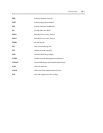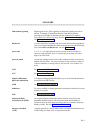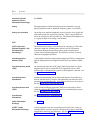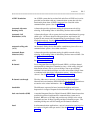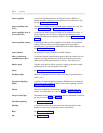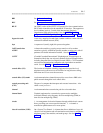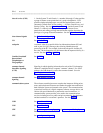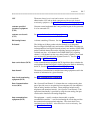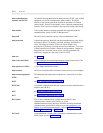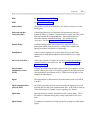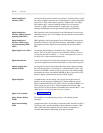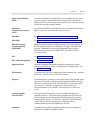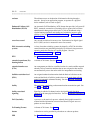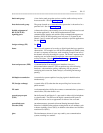GL-6 GLOSSARY
_ ___________________________________________________________________________________________________________________________
_ ___________________________________________________________________________________________________________________________
_ ___________________________________________________________________________________________________________________________
class of service (COS) 1. On the System 75 and Generic 1, a number (0 through 15) that specifies
a group of feature-access permissions of a group of telephones. COS
specifies whether telephone users can activate certain features such as
Automatic Callback and Call Forwarding — All Calls, Data Privacy, and
Priority Calling. See also class of restriction. 2. On the System 85 and
Generic 2, a numeric code that specifies a group of feature-access
permissions and calling-privilege restrictions that together determine the
privileges of a group of extension numbers. See also class of restriction.
clear-channel signals See 24th-channel signaling.
CO See central office.
codepoint A numeric value for a specific field of an information element (IE) and
used as part of a Q.931 message, thus allowing identification and
processing of the IE. For example, in the network-specific facilities IE,
the value 1 in the feature/service field means that the requested facility is a
service. See also Q.930 and Q.931.
Comite ’e Consultatif
International
Telephonique et
Telegraphique
See CCITT.
common-channel
interoffice signaling
(CCIS)
Signaling in which signaling information for each of the 23 information
channels is multiplexed into a separate "common" channel. For AT&T
products, the 24th channel is used as the common channel. See also
signaling system number 7.
common channel
signaling
See 24th channel signaling.
communications system The software-controlled processor complex that interprets dialing pulses,
tones, and/or keyboard characters and makes the proper interconnections
both within the system and external to the system. The communications
system itself consists of a digital computer, software, storage device, and
carriers with special hardware to perform the actual connections. A
communications system provides voice and/or data communications
services, including access to public and private networks, for telephones
and data terminals on a customer’s premises. See also switch.
COR See class of restriction.
COS See class of service.
CPE See customer-premises equipment and customer-provided equipment.
Both terms are abbreviated to CPE.
CPU See central processing unit.




